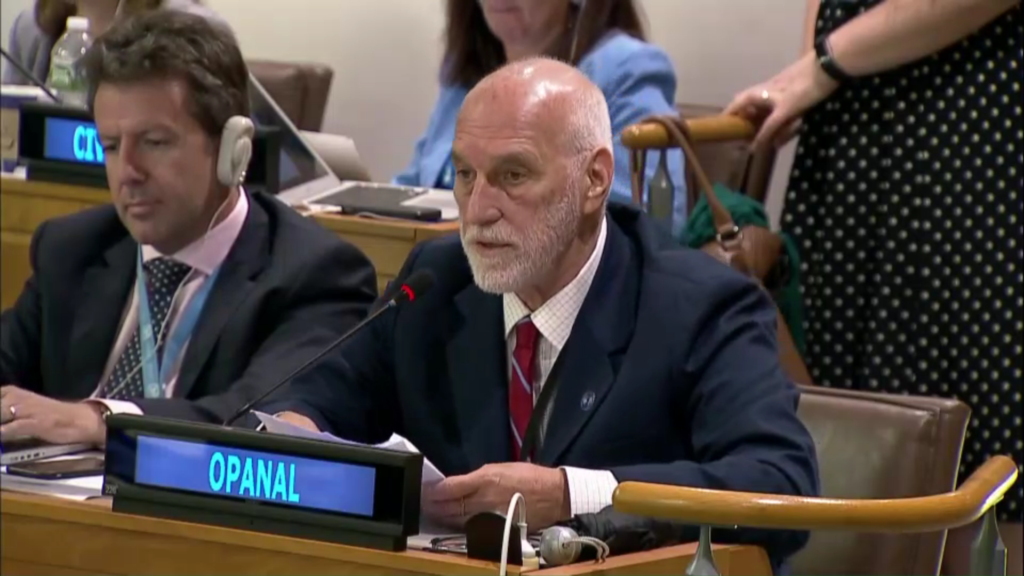
Participation of Ambassador Luiz Filipe de Macedo Soares, Secretary-General of OPANAL, during the adoption of the Treaty on the Prohibition of Nuclear Weapons on 7 July 2017.
On 7 July 2017, the Treaty on the Prohibition of Nuclear Weapons was adopted at the United Nations Headquarters. A total of 122 States voted in favor of the final draft Treaty, 1 voted against it and 1 State issued a vote of abstention (See Voting results). Article 1 of the Treaty, the core disposition of the instrument, prohibits each State Party to develop, test, produce, manufacture, otherwise acquire, possess or stockpile nuclear weapons or other nuclear explosive devices. The Treaty also prohibits the use and threat of use of nuclear weapons, as well as any stationing, installation or deployment of any nuclear weapons or other nuclear explosive devices.
The preamble of the Treaty mentions the determination of its States Parties to contribute to the realization of the purposes and principles of the Charter of the United Nations. It also mentions that a legally binding prohibition of nuclear weapons constitutes an important contribution towards the achievement and maintenance of a world free of nuclear weapons. The preamble also makes reference to the catastrophic humanitarian consequences that would result from any use of nuclear weapons and that any use of nuclear weapons would be contrary to International Law, in particular, to International Humanitarian Law. The preamble also mentions the risks posed by the existence of nuclear weapons, as well as the ethical imperatives for nuclear disarmament. Moreover, the preamble notes that the Treaty does not affect the inalienable right of its States Parties to develop and use nuclear energy for peaceful purposes.
The Treaty will be open for signature to all States in New York on 20 September 2017, within the framework of the 72nd Session of theUnited Nations General Assembly.
Member States and the Secretary-General of OPANAL participated actively in the Conference that negotiated the Treaty. Their contribution was extremely important for the establishment of a new norm of international law concerning the prohibition of nuclear weapons.
Fifty years ago, with the conclusion of the Treaty for the Prohibition of Nuclear Weapons in Latin America and the Caribbean - Treaty of Tlatelolco, the world saw the first example of a legally binding instrument on the prohibition of nuclear weapons in a permanently populated territory of the planet (the territory of the 33 States of Latin America and the Caribbean and adjacent high sea areas). With the adoption of the Treaty on the Prohibition of Nuclear Weapons in the United Nations, the path towards the total elimination of nuclear weapons is paved and the nuclear non-proliferation regime (based on the Treaty on the Non-Proliferation of Nuclear Weapons - NPT, the Comprehensive Nuclear-Test-Ban Treaty - CTBT, and the treaties establishing Nuclear-Weapon-Free Zones - NWFZs, and Mongolia as a nuclear-weapons-free State) is enhanced.
Watch the video of the negotiating session of 7 July 2017, in which the Treaty on the Prohibition of Nuclear Weapons was adopted.
Photos of the negotiation of the Treaty on the prohibition of nuclear weapons.
To learn more, see United Nations Conference to negotiate a legally binding instrument to prohibit nuclear weapons, leading towards their total elimination.